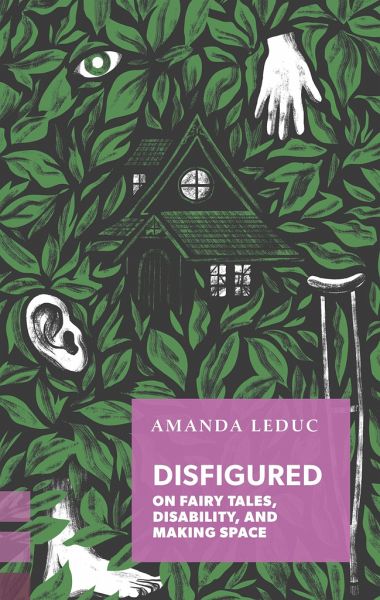
PAYBACK Punkte
10 °P sammeln!




Challenges the ableism of fairy tales and offers new ways to celebrate the magic of all bodies.
Amanda Leduc's essays and stories have appeared in publications across Canada, the US, and the UK. She is the author of the novels The Miracles of Ordinary Men and the forthcoming The Centaur's Wife . She has cerebral palsy and lives in Hamilton, Ontario, where she works as the Communications Coordinator for the Festival of Literary Diversity (FOLD), Canada's first festival for diverse authors and stories.
Produktdetails
- Exploded Views
- Verlag: Coach House Books
- Seitenzahl: 160
- Erscheinungstermin: 3. März 2020
- Englisch
- Abmessung: 190mm x 118mm x 20mm
- Gewicht: 272g
- ISBN-13: 9781552453957
- ISBN-10: 1552453952
- Artikelnr.: 55199350
Herstellerkennzeichnung
Libri GmbH
Europaallee 1
36244 Bad Hersfeld
gpsr@libri.de
Leduc certainly makes a lot of interesting and important points, especially for those who, like me, haven't thought about disfigurement and disability and their presentation in media to such an extent. Her points on the social model of disability, where society needs to change to accommodate the …
Mehr
Leduc certainly makes a lot of interesting and important points, especially for those who, like me, haven't thought about disfigurement and disability and their presentation in media to such an extent. Her points on the social model of disability, where society needs to change to accommodate the disabled instead of the disabled doing everything in their power to fit society, are absolutely vital to hear for an able bodied person. Especially since society at large still doesn't act or even think that way. Disabled people aren't getting "special treatment" when there is a ramp for accessibility or an interpreter, it's quite simply exactly what is needed for them to be part of the action. It's insane how we as a society have managed to exclude so many people from so many things and whenever they get one stop closer to achieving equality people are like "okay, but do you deserve it? Have you killed yourself getting here? Are you worthy of having this same right? Do I need to make room for you, because if so then that is special treatment and I will not do it." As if we loose anything instead of gaining something.
Anyway, like I said, Leduc asks a lot of interesting questions as well, includes some of her own medical history, what her parents and doctors thought, and she even includes some interviews with other disabled or disfigured folk, which was also super interesting and engaging.
Like a lot of other reviewers said, I think this is a great book to start the conversation and to start thinking about how much the stories oh so far removed from reality still form our reality, but I think it's not without flaws. Leduc kinda moves the goalposts for her criticism whenever it fit her and while I mostly understood where she came from, it still frustrates a little when there would still be room for valid criticisms without having to move the goalposts. There are also some structural issues, I remember one time towards the end of the book she suddenly picks up a point she made at least 100 pages earlier, out of nowhere. I also think she sometimes overgeneralizes a little bit too much, she acts like disability is the only reason you get bullied in school, she heavily insinuates that trying to heal (in the real world) or having a magical cure for disability (in your book/movie) is inherently ableist and she kinda lost me on the whole superhero tangent. I think I even sometimes struggled with who or what exactly she characterizes as disabled or as a disability, because those definitions seemed to change as well. As other reviewers have pointed out Leduc focusses mostly on Ariel's lack of legs as her disability instead of her muteness, which didn't make much sense to me since Ariel was never supposed to have legs and she wasn't disabled in the environment she was born (and supposed to be) in. Overall I definitely think this is an important book that will hopefully start the important discussions we need to have to finally make our world(s) more inclusive.
Weniger
Antworten 0 von 0 finden diese Rezension hilfreich
Antworten 0 von 0 finden diese Rezension hilfreich



